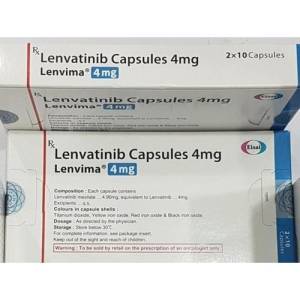Description
Lenvatinib Capsules: A Targeted Therapy for Advanced Cancers
Lenvatinib capsules are a prescription medication used to treat several types of advanced cancers. This targeted therapy works by blocking the activity of certain proteins involved in the growth and spread of cancer cells. It's crucial to understand that Lenvatinib is a powerful medicine with potential side effects, and should only be used under the strict supervision of a qualified oncologist.
Key Indications:
Lenvatinib is approved for the treatment of several advanced cancers, including but not limited to:
- Advanced Renal Cell Carcinoma (RCC): Used as a first-line treatment for patients with advanced or metastatic RCC, and also in some cases as a subsequent treatment after other therapies have failed.
- Differentiated Thyroid Cancer (DTC): Treatment of progressive, locally advanced or metastatic DTC, including those that have progressed after prior treatment with radioactive iodine.
- Hepatocellular Carcinoma (HCC): Used in combination with everolimus for the treatment of patients with unresectable HCC and who have not received prior systemic therapy.
Mechanism of Action:
Lenvatinib is a tyrosine kinase inhibitor (TKI). It works by blocking the activity of several receptor tyrosine kinases (RTKs), including:
- VEGFR1, VEGFR2, and VEGFR3: These receptors are crucial for angiogenesis (the formation of new blood vessels), which tumors rely on for growth and metastasis. By inhibiting these receptors, Lenvatinib can limit the blood supply to the tumor, hindering its growth and spread.
- FGFR1, FGFR2, FGFR3, and FGFR4: Fibroblast growth factor receptors play a role in cell growth and proliferation. Inhibition of these receptors further contributes to Lenvatinib's anti-cancer effects.
- KIT, RET, and PDGFRα: These receptors are also involved in tumor growth and development, and their inhibition contributes to the overall therapeutic effect.
Dosage and Administration:
The dosage and frequency of Lenvatinib are determined by your oncologist based on your individual medical condition, response to treatment, and potential side effects. It's typically taken orally with or without food. Never adjust your dosage without consulting your doctor.
Potential Side Effects:
Lenvatinib can cause a wide range of side effects, some of which can be severe. Common side effects include:
- High blood pressure (hypertension): This is a very common side effect and requires careful monitoring.
- Fatigue: Feeling tired or weak.
- Diarrhea: May be severe in some cases.
- Nausea and vomiting: Common gastrointestinal side effects.
- Decreased appetite: Leading to potential weight loss.
- Hair thinning (alopecia): Temporary hair loss.
- Hand-foot syndrome (palmar-plantar erythrodysesthesia): Painful redness and swelling of the palms and soles of the feet.
- Proteinuria (protein in urine): Indicates potential kidney damage and requires monitoring.
- Heart problems: Including changes in heart rhythm.
More serious side effects are possible and require immediate medical attention. These can include but are not limited to: perforated intestines, bleeding, blood clots, liver damage, and serious allergic reactions.
Important Precautions and Warnings:
- Pregnancy and Breastfeeding: Lenvatinib is contraindicated during pregnancy and breastfeeding. Effective contraception is necessary.
- Interactions with other medications: Inform your doctor of all medications, including over-the-counter drugs, herbal supplements, and vitamins, that you are taking. Lenvatinib can interact with other drugs.
- Liver and Kidney Function: Your liver and kidney function will need to be closely monitored while taking Lenvatinib.
This information is not a substitute for professional medical advice. Always consult your physician or oncologist before starting or stopping any medication, including Lenvatinib. They can assess your individual risk factors, determine the appropriate dosage, and monitor you for side effects. Only use Lenvatinib as prescribed.
